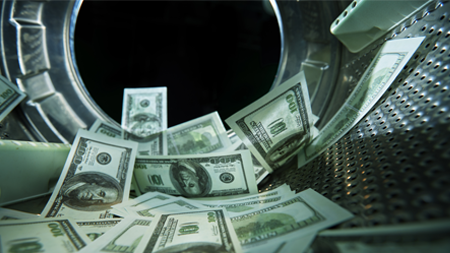Even By Fraud Business Standards, The Issue of Money Laundering is Huge
In 2009, the United Nations estimated that criminal proceeds were approximately 3.6% of global GDP, with 2.7% of GDP or $1.6 trillion a year being laundered. Seeing as Global GDP is higher today, if this percentage holds, the figures would be more like $2.5 trillion dollars a year being laundered. Making matters more staggering, cryptocurrency wasn’t a factor in 2009.

While the problem is international in scope, the United States is, of course, affected. In 2015, The U.S. Treasury Department issued a “National Money Laundering Risk Assessment,” which said, “…while recognizing the limitations of the data sets utilized, this assessment estimates that about $300 Billion is generated annually in illicit proceeds. Fraud and drug trafficking offenses generate most of those proceeds.” That assessment was issued seven years ago so, again the amounts involved likely have only increased.
While we worry about how much money is getting folded, pressed, and sent back to its non-rightful owner, the thing to remember is just how all that money got dirty in the first place.
According to the Financial Action Task Force, the international group that tries to fight it, money laundering:
…enables the criminal to enjoy these profits without jeopardising their source. Illegal arms sales, smuggling, and the activities of organised crime, including, for example, drug trafficking and prostitution rings, can generate huge amounts of proceeds. Embezzlement, insider trading, bribery and computer fraud schemes can also produce large profits and create the incentive to “legitimise” the ill-gotten gains through money laundering.
Adding to this kind of dirty money we now have foreign policy matters, including the current war in Ukraine, which led the United States Office of Foreign Assets Control to create sanctions for those on a “blocked persons” list, create investment banks and sanctions against entities operating in designated sectors of the Russian Economy.
Congress has weighed in too. In January 2021, they passed an Anti-Money Laundering Act. That Act established a Whistleblower reward program for those who report money laundering violations to the U.S. It includes reporting requirements for banks as well. However, there have been no awards for reporting laundered money, as the law currently includes no mandatory awards. Further, the Treasury Department has not enacted any regulations for whistleblowers to report such violations.
As we post this, there is legislation pending (House Bill 7195) which would amend the Anti-Money Laundering Act and model its whistleblower program on the Securities and Exchange Commission (SEC) Whistleblower program. The Bill would create mandatory awards of 10-30% for any collection or monetary sanctions imposed on the actions and provide a fund to support it.
We know there are trillions of dollars in the laundry and we know it is the dirtiest kind of money there is. We know that to find it, the government will need whistleblowers. We do not know if there will be any awards to report by this time next year.
Written by By Matthew Beddingfield of Zerbe, Miller, Fingeret, Frank & Jadav LLP and Tony Munter of Price Benowitz. Edited by Kate Scanlan of Keller Grover LLP and Tony Munter of Price Benowitz. Fact checked by Julia-Jeane Lighten of Taxpayers Against Fraud.